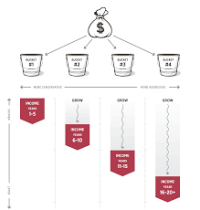Market Volatility, Risk Tolerance and a Good Nights Sleep
Posted by Matthew Adamson on Thu, 11/08/2018 - 10:06
Market volatility shouldn’t keep you up at night. Easier said in theory than in practice, right? The week of October 8th was a quick reminder that volatility exists in the stock market. Always has and always will. While a 3% drop in the S&P 500 is outside of the daily norm, a 1% swing isn’t.
Back-to-School Feels Like New Year’s Day?
Posted by Matthew Adamson on Fri, 10/26/2018 - 13:36
The more I’ve talked with families that have younger children the more I realized this was the same for most of them. Since everyone is in that New Year’s mood, I suggest adding another to do on that list. New Year’s is my busiest time of year, the second most popular New Year’s resolution next to losing weight is getting your personal finances straightened out. Since the kids are back in school, now would be a good time to look at the cost of higher education.
Football is Back! Turn Fantasy into Reality
Posted by Matthew Adamson on Fri, 10/26/2018 - 13:08
One telltale sign that summer is quickly winding down and fall is in the air is that football is back! What better way to celebrate that than spending countless hours crafting/drafting and monitoring your retirement plan…err your fantasy football team.
Perceived vs. Calculated Risk: It Could Make All the Difference
Posted by Matthew Adamson on Fri, 10/26/2018 - 11:19
What I hope to highlight here is the fact that we should be using calculated risk to do an analysis of our investments over time. However, most of the time, people let their perceived risk of investments drive their decision making. That perceived risk is really not a calculation of legitimate data, it is based around FEAR and subjective outlooks which influence your decision-making processes. Let’s quickly break down what I am referring to here.
The Basics of Credit Scores and Credit Reports
Posted by Lignum Wealth Management on Mon, 09/10/2018 - 10:51
As consumers, we know that having a good credit score is important. Whether you are applying for a loan or signing up for a credit card, your credit score plays a major role in determining if you will be approved. Your credit score can also have a significant impact on loan terms and borrowing costs.
What is a credit score?
When you borrow money from a lender or sign a contract pledging to make payments, the other party needs to assess how likely it is that you will fulfill your obligations. Your credit score is a measure of risk that helps lenders quantify this likelihood in real time.
Buyer Beware: Tips for Safe Online Shopping
Posted by Lignum Wealth Management on Mon, 09/10/2018 - 10:48
Looking for power tools? A vintage Chanel purse? A living-room sofa? Millions of shoppers are bypassing brick-and-mortar stores, as well as their respective websites, in favor of purchasing such items from individual online sellers. For many people, sites like Craigslist and eBay offer a chance to save on everyday items and luxury products, both new and used—all from the comfort of their own homes.
Is Your W-4 Withholding Accurate?
Posted by Lignum Wealth Management on Mon, 09/10/2018 - 10:43
We all know that federal income taxes are withheld from our paychecks. But are you aware of the degree of control you have over how much is withheld? Here, we’ll discuss the importance of having an accurate W-4 holding, including how recent changes to the tax code present a unique situation for taxpayers in 2018.
Is Maslow’s Hierarchy of Needs Eroding Your Wealth?
Posted by Matthew Adamson on Tue, 08/28/2018 - 14:13
Most of us are aware of Maslow’s hierarchy of needs with physiological and safety needs being at the foundation of what most human beings are most concerned with in their lives. Unfortunately, most of the time these needs are at odds with what the best financial decisions might be. Opportunity cost is the first area where, as financial advisors, we are asked to help clients navigate the best financial decision even though it might not feel the best at the present time.
Lignum Lessons - Practice Patience When Growing Your Investments
Posted by Matthew Adamson on Wed, 08/15/2018 - 16:18
“Someone is sitting in the shade today because someone planted a tree a long time ago” – Warren Buffet
Sometimes it is difficult to look back in life and wonder how you got there. Working with our clients through retirement has taught us many lessons, cone more important than to have a plan, put care into that plan and let time work.
Retirement Income Planning: The Total Return Approach Vs. the Bucket Approach
Posted by Lignum Wealth Management on Tue, 06/26/2018 - 16:04
Most working Americans have only one source of steady income before they retire: their jobs. When you retire, however, your income will likely come from a number of sources, such as retirement accounts, social security benefits, pensions, and part-time work. When deciding how to manage your various assets to ensure a steady retirement income stream, there are two main strategies to consider: the total return approach and the investment pool—or bucket—approach.










